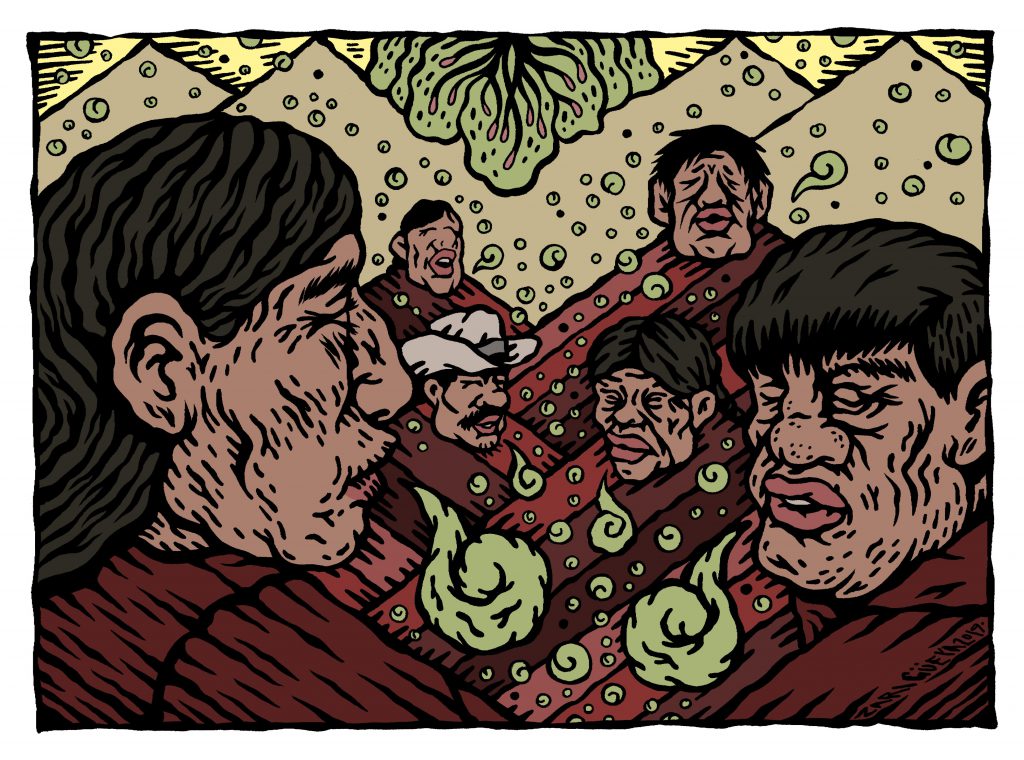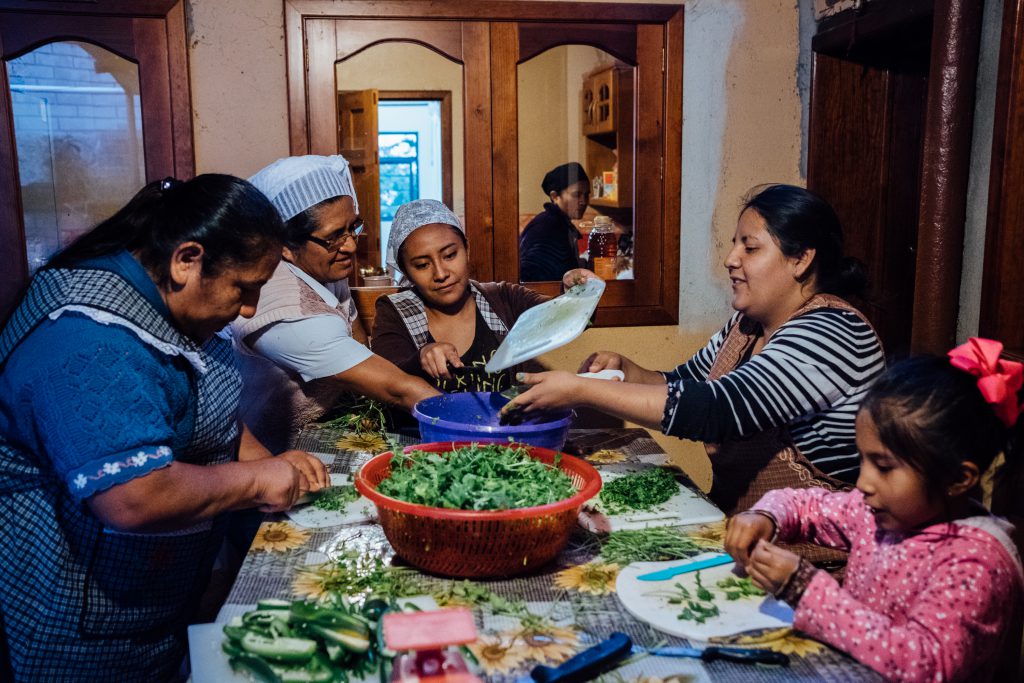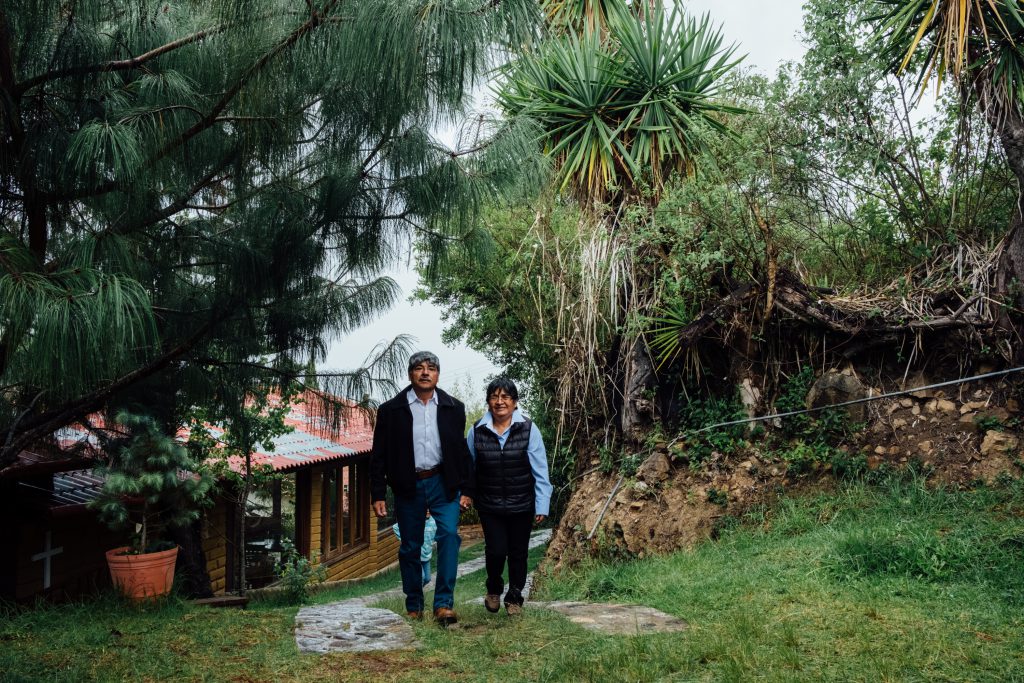
Chapter 2
Lifelong community service
Out of 570 municipalities in Oaxaca, 417 follow their governing system of uses and customs instead of being governed by political parties. The system of uses and customs sets rules for the election of representatives as well as for governance.
In Oaxaca, it has been exercised for decades. But it took the Zapatista movement from the neighbouring state of Chiapas to legitimize it within the Mexican Constitution. When the movement resisting the neoliberal model started growing after The North American Free Trade Agreement (NAFTA) came into force in 1994, fears appeared among members of the state government of Oaxaca that indigenous people there might follow the Zapatistas. As prevention, the governor at that time started the process to legally recognize traditional governing methods, which was concluded in 1997. Article 2 of the current Mexican Constitution recognizes uses and customs as a system to elect authorities of communities of indigenous peoples. This system eliminates national political parties from political processes. An important step in the process of legitimizing uses and customs as a parallel governing system was the recognition of the indigenous peoples and their rights.
Apart from Oaxaca, indigenous communities in other states in Mexico follow the system of uses and customs, such as Guerrero, Chiapas, Yucatán, Michoacán, and others. However, there are different gradients of communality across the country.
Maximum authority
After enjoying their breakfast, Eliel Cruz Peréz and his sister Rosa walk through Yavesía to the municipal building. The door at the meeting room is already open; villagers are slowly joining the gathering for the general assembly. Sitting on plastic chairs in a room with open windows, they will spend hours discussing territory designation issues. Now and then, one of them comes out of the meeting room to get fresh air and stretch a bit. The debate is heated, people are presenting their opinions.
"In the assembly where all the families are represented, the element that brings us together is the problem or the necessity we need to solve to live happily and content in our territory. It is the assembly that regulates life, gives it structure," explains Jaime Martinéz Luna.
The general assembly has the maximum authority in villages and towns that follow the system of uses and customs. It could be compared to a legislative body of a state where proposals are debated and voted for, except for one big difference. While in the parliament, for example, any debate about laws and issues happens among the elected representatives, at the assemblies representatives from every household participate and make decisions together. Anybody from the community can bring up an issue that needs to be discussed.
Martínez Luna highlights that the assembly does not exercise power because it is the opinion of everybody. "The agreement is not vertical, it is a horizontal result that resolves the mood, creativity, and capacity of all. Therefore the assembly is not power, it is the highest authority," he clarifies.

In the past, general assemblies sounded like beehives. One person speaking over another, community members expressed their opinions and thus created a sound similar to the one of working bees. After some time, often after some hours, the voices started diminishing until only a few were heard. It was a sign that the community was coming to a consensus.
This way of making decisions is being lost nowadays, mostly in bigger villages or towns. Those now have Council of Elders or different committees that discuss the possible solutions to the raised challenges first. After that, they present selected solutions to the assembly, which votes for the most appropriate one. In the end, the majority decides.
What has not changed is the fact that participation at the assembly is obligatory. Communities have their internal rules, sometimes written, often including punishments for those who do not participate in the debates. In some cases, citizens pay a fine, and the money is used in the social projects of the community, such as activities at schools. In others, if one does not attend the decision-making process, their community benefits diminish. For example, not participating at the assemblies may result in not obtaining a piece of land for agricultural activities, if the assembly decides so.
Joel Gonzalo Méndez from the Secretariat of Ixtlán de Juárez shows us the lists of people who participated at the last assemblies. "One of the strategies of the municipality is promoting citizen participation because, in one way or another, it helps us to maintain this order of uses and customs or what they now call - internal regulatory systems," the 29-year-old citizen states.
The system of cargos
The Mexican Constitution determines the rules for electing municipal governments. Every municipality in Mexico, including Oaxaca, must have its president (alcalde), city council whose members are called regidores, and a local attorney general (síndico).
As political parties are not present in many indigenous villages in Oaxaca, these and other formal positions are taken on by community members by participating in the hierarchical system of cargos.
Before becoming a municipal president or a local attorney general, one usually first serves other cargos. In the beginning, in many villages, there is a position of topil who is responsible for the cleanliness of a village or a town. The next step is a policeman, a key person of the church, a leader of different committees, such as a committee of education, health, drinking water, farming, etc. The path is created to gain all the experience necessary to be able to commit to the most responsible cargos.
Baltazar Hernández Bautista did his first cargo at the age of 14. The times were different back in the 70s, he says. "When they saw a boy becoming mature, they elected him for a cargo. I was in charge of the keys from the church," he says. Nowadays, 18-year-old men are eligible for cargos, unless they decide to study at the university. In such cases the community system does not interfere.
Cargos at the municipality are for a year and a half, and people get elected by the assembly, based on their merits. People provide this kind of community service without remuneration. Taking under consideration the villages we visited, only Ixtlán de Juárez pays for cargos with the biggest responsibilities. It pays per diem. Joel Gonzalo Méndez from the secretariat argues that this remuneration – it can be anywhere from 3500 to 10 000 pesos depending on the cargo per month – covers only the basic needs of the families of the men serving the community as they cannot do anything else. A contra-argument from Zapotec intellectuals is that where money is, corruption is easily introduced.
The system is even more complex. While municipal issues are discussed at the assemblies of citizens, in many communities they also have assemblies of community members or comuneros. The majority of the communities have their territory designated by the federal Agrarian law, and their members are also registered under the same law to be able to manage territory and natural resources, including forests. This assembly also elects its representatives that fulfil their cargos at the Secretariat of Common Goods. The last cargo that Baltazar Hernández has committed to is the one of the president of that secretariat.
Listen to Baltazar Hernández Bautista as he talks about how the system of cargos works and what are its challenges.
Impossible without the help of the family
The house and garden of the Hernández family are busy. Women of all ages are cutting chilli peppers, cooking atole - a traditional corn drink - in a large pot and stirring pork meat in another one. "How many people are coming?" I ask. When Rosalinda Toro Maldonado, Baltazar's wife, invited us to the celebration, she said it would be a small one.
"About two hundred? I don’t know, the authorities are inviting," she says now, and it starts to make sense why they are cooking so much food. After a short while, we hear a public announcement from the municipality, inviting everybody from the village to the house of Baltazar Hernández Bautista as he will become the new president of Secretariat of Common Goods in Capulálpam de Méndez the following day.

Cargos demand a certain time per week, depending on the position in the hierarchy; it can be from a few hours a week to a full-time position, such as the one that Baltazar enters. Depending on the system of each village, one can spend more than 20 years of devoting time to his village.
Asking for the permission of the family to allow a man to do his cargo is an integral part of the ceremony when exchanging community cargos. As the visitors from the village fill in the yard of the Hernández family, Baltazar speaks first. After him Rosalinda encourages other women also to support their husbands when providing community service. She knows too well, as she has been in charge of the family’s responsibilities for more than half of the time they have spent together as husband and wife.
The Hernández family has been running a little coffee shop, Verbo de Mendez, with a stunning view over the village of Capulálpam. Yet, whenever Baltazar takes on his cargo, his wife Rosalinda and his oldest daughter, Eunice, become in charge. "I had to quit my job when my father became the president of the municipality, and I came back to the village to help my family and to support my dad. Women are the ones who sustain this system by supporting their husbands. Without women, this way of life would not be possible. It is the system we have here, and this system keeps us united," Eunice states with great passion.

"It is here where a woman plays an important role," Baltazar explains how his family deals with his community service. “During all my cargos that I have done since I got married when I was 20 years old, my wife has been sustaining the responsibilities in the house. And as the cargos become more time-consuming, more family members become involved. My cousins, uncles, sisters-in-law tell me: "We are here to accompany you." It is very empowering to hear that," Hernández Bautista says.
First women presidents
The system of cargos has historically been a space for men to perform. In Capulpám de Méndez, women themselves do not express the need to enter the system of cargos, apart from leading the committees of education or gender. Many women consider cargos additional work to their responsibilities in the house, others think it would create an imbalance in a system that has been working well.
Some other villages in the region, however, have been experimenting with women inclusion into the system of cargos. In Yavesía, a retired former nurse Olivia Basilia brought up the topic of women participating at the assemblies. Even though the first reaction of local men was that women do not have to attend the assemblies because their husbands do, she insisted. "If we do not participate, we cannot express our opinion because we do not know what happens in the village," she says. She brought the issue to the assembly, and although some men did not agree, the majority approved the participation of women. Since then, Olivia is a frequent participant who does not hesitate to speak up. And she is not the only one. Especially women whose husbands are not present due to migration or who live alone come to the assemblies. "Men at the beginning used to laugh when women spoke, I always asked them to be respectful. After some time, they understood that we also have the right to express ourselves," Basilia recalls.
Ana Ramírez Martínez is currently in charge of the health issues of Yavesía and also attends assemblies. "I think it is important to be part of the system of cargos. Once entering the system, we can learn a lot of things," Ana thinks. However, she also states some challenges. "It is complicated when a woman has a family and has to attend the housework while being in the office the whole week. It is different in the case of men."
As a consequence of Olivia's activity, there came a moment when she was proposed to become a president of the municipality. And the assembly elected her. She resisted at first, but in the end, she accepted. Olivia states that during her presidency, she felt respected by the men in the village.
In Santa Catarina Lachatao, one of the challenges the community is facing is the lack of citizens. Within the past decades, the village has become tiny due to migration, yet the number of cargos did not diminish much. That was one of the reasons why women are an integral part of the system of cargos there. Regina Alavéz Hernández is currently a president, and she is also in charge of cooking at the local ecotourism community company.
Listen to Olivia Basilia and Regina Alavéz Hernández as they speak about how it is to be a municipal president.